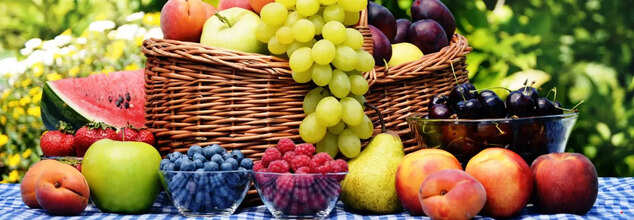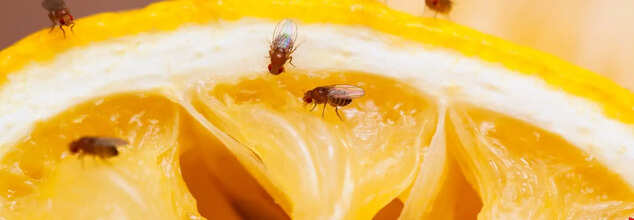- Health Conditions A-Z
- Health & Wellness
- Nutrition
- Fitness
- Health News
- Ayurveda
- Videos
- Medicine A-Z
- Parenting
- Web Stories
Can Fruits Really Help You Lose Weight?

Fruits and weight loss (Credit: Canva)
Weight loss is largely dependent on your calorie intake, and fruits are a great option in this regard. They are not only packed with essential nutrients, but their high water content helps you feel full, while their natural sweetness helps curb cravings. Fruit often gets a bad rap for containing carbohydrates and naturally occurring sugar. However, both of those components are parts of a healthy diet and can be a part of your weight loss or management journey.
What Are The Best Fruits to Choose for Weight Loss?
There aren't any specific fruits that can be singled out as the best choices for weight management. That's because a variety of fruits in moderate portions can aid in weight loss. Choose fruits you enjoy. The Centers for Disease Control and Prevention suggests these fruits to try- Apples
- Bananas
- Blueberries
- Grapes
- Oranges
- Strawberries
Research has even shown a connection between fruit intake and weight loss. One study found that among adults who had overweight or obese, those who ate more fruit experienced greater weight loss than those who didn't.2 Another study, which followed more than 130,000 adults over 24 years, found that consuming fruit was associated with improved weight loss over time. Try to consume a variety of fruits to get a spectrum of nutrients and antioxidants.
When to Eat Fruit?
Since the carbs in fruit help fuel activity, when you eat fruit matters, too. Try building fruit into the meals and snacks you consume during your more active hours of the day. That may mean eating a banana before a workout or having berries with breakfast before heading to work. Try pairing an apple with almond butter in the afternoon to help power through the rest of the day.Eating fruit before an exercise or before you start your day can provide you with carbohydrates that are easily digestible and will keep your energy up.8
How Much Fruit Should You Eat?
The U.S. Department of Agriculture recommends that most adults should eat 1.5 to 2.5 cups of fruit every day. This can include fruit that is canned, fresh, dried, frozen, or juiced. Try to get at least half of your daily fruit from whole fruits (rather than 100% fruit juice), if accessible.Can Vegan Diet Make You Weak?

Credit: Canva
Vegan diets are a plant-based nutrition programme, which involves eating solely plant-based foods such as vegetables, fruits, nuts, seeds and whole grains. Following this kind of diet means refraining from all types of animal products like eggs, dairy, meats, etc. Advocates of this diet across the world argue that a well-balanced vegan diet not only protects people from chronic diseases such as cancer and heart disease but also saves animals from the pain and terror of slaughter and factory conditions. A vegan diet also contributes to the environment by significantly decreasing the emission of greenhouse gases.
How To Lose Weight With Vegan Diet
Adopting a vegan diet can be an effective strategy for weight loss, primarily due to its low levels of saturated fats and calories. By removing animal products, which are often high in saturated fats, individuals can create a less energy-dense diet. Moreover, vegan and vegetarian diets are rich in high-fibre foods.
Increased fibre intake enhances feelings of fullness, curbing hunger and promoting gut health, all while reducing overall caloric consumption. As a result, a vegan diet can facilitate weight loss and help maintain a healthy weight. It may also play a role in preventing obesity and reducing the risk factors associated with conditions like type 2 diabetes, high blood pressure, and heart disease.
Can Vegan Diet Make You Weak?
No. Consuming only plant-based food items does not make you weak or always hungry or unable to do workouts. Vegans can achieve all their energy needs by eating a well-balanced plant-based diet that includes all the macronutrients (proteins, carbohydrates, fats) as well as micronutrients (vitamins and minerals). However, like any diet, a vegan diet can be unhealthy if you eat processed foods, added sugar, and unhealthy fats. This type of vegan diet can leave you feeling low on energy and too tired to exercise.
Vegan Diet Helps Boost Gut Microbiome
Besides active weight loss, there is another significant benefit of eating vegan food. A 2023 study, published in the journal Nature, elucidated how different diet types influence an individual's microbiota composition. Research indicates that there is a significantly higher diversity of gut bacteria, like Bifidobacteria and Lactobacillus, capable of breaking down fibres found in vegan and vegetarian diets compared to the bacteria needed to metabolise the fats and proteins from animal-based diets. This suggests that plant-based diets promote a more varied and beneficial gut microbiome, which can enhance digestive health and nutrient absorption. The greater abundance of fibre-digesting bacteria may also contribute to improved overall health outcomes, as these microbes are linked to better metabolic functions and reduced inflammation.
Where Do Fruit Flies Lay Eggs And What Happens When You Eat Them?

Credit: Canva
You're sitting at home in your favourite chair, scrolling through your social media feed. From the corner of your eye, you notice something small and black darting around, near your face. You stop for a moment, chalking it up to eye strain from too much gadget use. But it only takes a few seconds for you to realise that you're actually dealing with a fast-flying, pint-sized annoyance — one that can quickly multiply inside your house, if you don't do anything about it.
Fruit flies (Drosophila melanogaster) are the bane of many a housekeeper or restaurant staffer. Tiny enough to be tough to kill and oftentimes a persistent problem because of their impressive reproductive capabilities (up to 500 eggs at a time), these unwelcome house guests go by such unflattering names as banana flies, vinegar flies, vinegar gnats, and sour flies.
But those not-so-nice nicknames offer a clue as to where these potential disease-carriers like to hang out and lay eggs. Fruit flies love decaying, rotting, or pungent smells, and are thus attracted to fruits and vegetables that are already going bad. Such food items serve as both a nesting place and a food source for newly hatched fruit fly maggots. Oh, and if you have a habit of leaving uncovered glasses of juice or wine, beer bottles, or vinegar containers around the house, you're bound to attract these pests, too.
What happens if you accidentally ingest fruit fly eggs?
Many cooking and baking enthusiasts have found ways to repurpose otherwise unappetizing food items as ingredients. But now that you know that such foods are fruit fly favorites, a new question might be floating around in your head: What happens if you ingest a fruit or vegetable that already has (ick) fruit fly eggs in it? Is it safe to eat overripe bananas and other fruits?
As repulsive as the notion undeniably is, at the very least, it's not an instantly life-threatening predicament. Realistically, you can expect the typical symptoms that one would experience from eating nasty food, such as nausea, vomiting, and abdominal pain. A bacterial infection or allergic reaction is also possible, both of which can be dangerous. A particularly perilous, but rare, possibility is myiasis — when fruit fly eggs survive your digestive acids long enough to hatch into larvae, take up residence inside your body, and start eating your organ tissue, which may bring abdominal pain, diarrhoea, and vomiting.
With that said, timely medical intervention can help you bounce back quickly and prevent further complications, so seek medical attention as soon as you suspect that something's off with the food you've just eaten.
Selenium, Zinc And Iodine: How These Nutrients Balance Your Thyroid Naturally?

Health and me
Hidden at the bottom of your neck, the thyroid gland is a tiny thing, but it has a gigantic responsibility to handle. Acting as the body's master regulator of metabolism, energy, pulse rate, temperature, and even fertility, the butterfly-shaped endocrine gland is an absolute necessity to your well-being. So serious is its role that when the thyroid is out of balance, almost every cell and system in the body suffers.
Though it is very important, thyroid wellness remains largely misconceived and underrated. Millions of people all over the world quietly endure symptoms of thyroid malfunction — fatigue, weight fluctuation without reason, mood instability, hair loss, infertility — unaware that a micronutrient imbalance might be at the root. While drugs and thyroid hormone substitutes usually take center stage, the key to thyroid wellness is something much easier and more potent: diet.
Your thyroid isn't a gland — it's an inner compass for your body. It regulates energy, mood, metabolism, fertility, and we tend to overlook the very micronutrients that keep it running, according to dietitian Lavleen Kaur. Three underappreciated heroes — iodine, selenium, and zinc — are the foundation of this nutritional system. These micronutrients, commonly ingested in trace amounts, play quietly in the background dictating the hormone production, conversion, and immune resistance that your thyroid needs to work best.
Iodine: The Hormone Maker
No topic of thyroid health can be started without iodine. This trace mineral is the chief component of thyroid hormones — triiodothyronine (T3) and thyroxine (T4). Without sufficient iodine, the thyroid is unable to make these vital hormones and the balances and functions in the body become imbalanced and dysregulated, resulting in goiter and hypothyroidism.
"Iodine is not negotiable," according to Lavleen Kaur. "It powers the thyroid's very function. But nowadays, in the name of 'healthy eating,' many substitute iodized salt with pink or rock salt, not knowing that these so-called healthy options are iodine-free."
In the quest to remain 'clean' or 'natural,' most do so unwittingly, robbing the body of one of the most important nutrients. The solution is not about demonizing rock salt or romanticizing iodized salt — it's all about balance and vigilance. "Use rock salt in your daily sabzis or dals, but put iodised salt in chutneys or pickles," she suggests.
And salt isn't the only choice. "Curd, nuts, seeds, sprouts, and greens are also nature's iodine gifts," she adds. In functional medicine, the value of iodine goes beyond thyroid function to include metabolic well-being, hormonal balance, and regulation of growth, so making it necessary not only for thyroid function but for systemic vitality.
Selenium: The Thyroid's Shield
If iodine constructs thyroid hormones, selenium guards them — and the gland — from damage. Selenium is a potent antioxidant that helps convert T4 (inactive) to T3 (active), the hormonal form your body utilizes. It also protects the thyroid against oxidative stress and inflammation.
Selenium is the thyroid's shield," states Kaur. "You don't require pills. A handful of Brazil nuts per week, or Indian staples such as lentils and sunflower seeds, will suffice."
At a functional level, selenium is integrated into selenoproteins, which are crucial for hormone metabolism and immune protection. The proteins prevent autoimmune thyroid disease like Hashimoto's thyroiditis by dampening chronic inflammation in the gland.
In selenium-deficient people, research has demonstrated increased rates of thyroid disease aggravation. Luckily, foods high in selenium are easily available, and it is possible to strengthen thyroid resistance through daily fare — no script needed.
Zinc: The Quiet Multi-tasks
Too often in the shadow of sexier nutrients, zinc plays the quiet multitasker in the thyroid story. It helps in the synthesis and conversion of thyroid hormones, regulates enzyme function, and aids immune function — a triad of activity crucial to thyroid equilibrium.
"Zinc is in the background, but it's essential," stresses Kaur. "Eat pumpkin seeds, legumes, and whole grains, and observe the change in energy and equilibrium."
Zinc also impacts the thyroid's capacity to uptake iodine, earning it the title of synergistic nutrient in thyroid physiology. Beyond the thyroid, zinc's significance in functional medicine spills over into issues with gut health, mood, and reproductive health. Not only can a lack of zinc undermine immune function, it can also compromise the body's capacity to convert T4 to T3 efficiently — causing subtle hypothyroidism symptoms such as brain fog, fatigue, and cold intolerance.
Why Your Thyroid Requires Balance?
The prevailing narrative of thyroid health tends to center on repairing what's damaged but what if the discussion changed to supporting what's already smart and regulating?
As Kaur explains, "We don't need to 'fix' the thyroid. We need to nourish it. Respect it." Connecting food to purpose and routine to intention turns thyroid care into a sustainable lifestyle instead of a reactive treatment.
Rather than running to supplements at the first hint of trouble, use real, whole foods as your initial defense — iodised salt, yogurt, Brazil nuts, legumes, seeds, and leafy greens. These functional foods are silently potent, particularly when eaten regularly and with awareness.
Should You Consume Supplements?
Although good-quality supplements may help those who have dietary limitations, absorption problems, or particular deficiencies, they must never act as substitutes for food as your source of nutrients. Before adding any supplement to your regimen — particularly iodine, selenium, or zinc — speak with your healthcare professional. Nutrient interactions, medical conditions, and dosing tolerances can differ greatly among individuals.
Thyroid wellness isn't about excess. It's about the little, everyday routines that root your body's hormonal harmony. With a sprinkle of iodized salt or a handful of Brazil nuts, every food decision has the power to rebalance your thyroid — and with it, your energy.
As Lavleen Kaur puts it, "True wellness is not loud. It's rooted. Balanced. And often begins with something as small as a pinch of the right salt."
Lavleen Kaur is a certified Dietitian and Founder of Santushti Holistic Health & Diet Insight Nutrition Academy in India
© 2024 Bennett, Coleman & Company Limited

